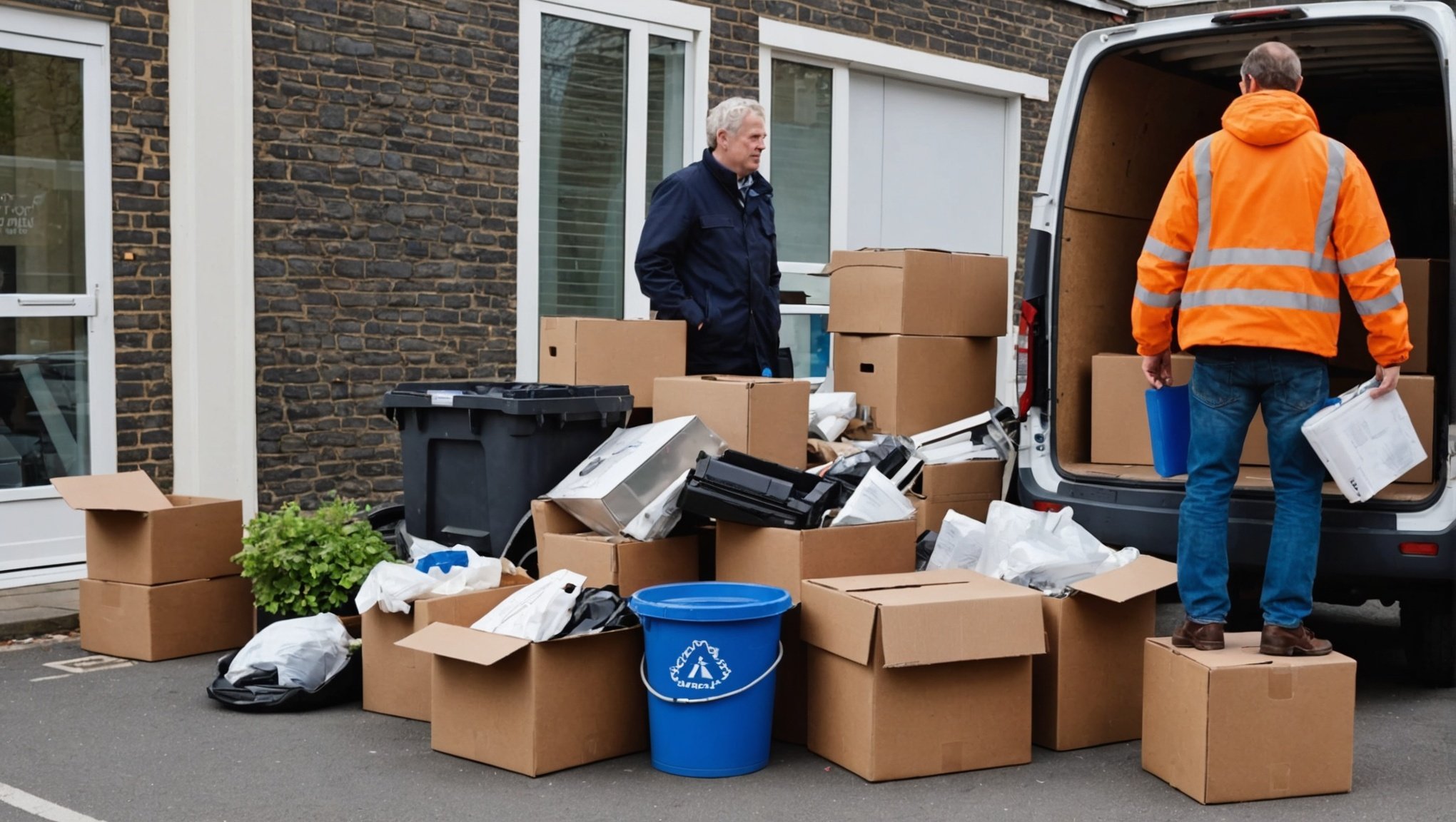As you prepare for a big move, you’re likely to come across possessions that you no longer need or want. These could range from outdated furniture to electronic waste, or even hazardous materials. The process of disposing of these items can be complex and sometimes overwhelming. Furthermore, the correct means of disposal is not always clear, as it varies depending on the type of waste in question. This article will guide you through the protocol for disposing of unwanted items pre-move in the UK, helping you responsibly rid your home or office of clutter while also protecting the environment.
The Role of Waste Management Agencies
Waste management agencies play a crucial role in the disposal of unwanted items in the UK. These agencies are responsible for providing guidance on how different types of waste should be disposed of and ensuring that waste is collected and handled in a way that minimises potential harm to the environment and human health.
Dans le meme genre : How do you set up a digital inventory for your items before a UK home move?
It is the responsibility of every tenant or office owner to get in touch with their local waste management agency to understand what the correct disposal protocols are. This is because these protocols can vary based on the type of waste, and the regulations in place in different regions of the UK.
For instance, for general household items such as furniture and appliances, contacting the local council or private waste removal company will provide information on where to take these items for recycling or disposal. They also often offer collection services for larger items that can’t be easily transported.
Lire également : How can you find a trustworthy pet relocation service in the UK?
Understanding the Recycling Process
Recycling is a critical part of waste management. It involves converting waste materials into reusable materials, thus reducing the consumption of raw materials, energy usage, and pollution. Many unwanted household and office items can be recycled, thus diverting them from landfills and contributing to a more sustainable environment.
When sorting through your unwanted items, look for recycling symbols on your items. Any items with these symbols should be separated from general waste and placed in your recycling bin. However, it’s important to check with your local recycling facility what types of items they accept, as not everything can be recycled curbside.
Dealing with Hazardous Waste
Some items are classified as hazardous waste due to the potential harm they can cause to the environment and human health. This category includes items such as batteries, paints, solvents, pesticides, oils, asbestos, and certain types of electronic waste.
Before moving, it’s essential to identify any hazardous waste items and ensure they are disposed of correctly. These items should not be placed in the regular waste or recycling bin.
Instead, you will need to take them to a designated hazardous waste disposal facility. Many local councils provide this service, so it’s a good idea to check with your local council for guidance on where and how to dispose of hazardous waste in your area.
The Importance of Donation and Recovery
Donation and recovery are other great options for dealing with unwanted items during a move. Giving away items that are still in good condition to charity shops or community organisations can help reduce waste and support good causes. Certain items, such as furniture or electronics, can also be recovered or refurbished for further use.
This can be a great solution if you have items that you no longer need but are still in good condition. However, it’s worth noting that charities and recovery organisations typically have guidelines on what types of items they will accept, so it’s recommended that you check with them before delivering your items.
By donating and recovering items, you not only reduce the volume of waste you contribute to but also potentially help someone else who can make use of the items. It’s a win-win for everyone, and particularly beneficial for the environment.
Navigating the Disposal of Electronic Waste
Electronic waste or e-waste refers to discarded electronic or electrical devices. This can include anything from old laptops and monitors to fridges and toasters. Improper disposal of e-waste can potentially lead to harmful substances entering the environment.
In the UK, many retailers offer a take-back scheme for old electrical and electronic equipment. Under these schemes, when you buy a new electrical item, you can return your old item to the retailer for safe disposal.
Alternatively, you can also bring your e-waste to a local recycling facility specifically designed to handle electronic waste. Some councils also offer collection services for e-waste. Remember, electronic items should never be placed in the regular waste bin.
By adhering to these protocols, you will greatly contribute to a more sustainable disposal of unwanted items, making your move a more environmentally-friendly process.
Obligations and Responsibilities under the Relevant Regulations
Being aware of and complying with the relevant regulations is crucial when it comes to disposing of unwanted items. The UK government, through the Environment Agency, has established rules and regulations that govern waste management. Although these regulations mainly aim to protect the environment and human health, they also serve as guidelines for individuals, businesses, and waste carriers on the proper handling and disposal of waste.
The Waste Duty of Care, for instance, is a legal document that outlines a set of responsibilities for anyone who produces, carries, keeps, disposes of, or otherwise manages waste. It entails ensuring that waste does not escape from your control, that it is transported by a registered waste carrier, and that it is transferred to a permitted site that can legally accept it.
A failure to abide by these regulations can result in hefty fines and legal consequences. Therefore, before you start the process of decluttering pre-move, it’s essential to familiarise yourself with these relevant regulations to ensure that you’re disposing of your unwanted items in a legal and environmentally responsible manner.
Additionally, you should also take note of the specific storage areas and recycling bins provided for the different types of waste – mixed recycling, glass bottles, bulky waste, etc. Using plastic bags for waste which are not suitable for recycling can also lead to penalties.
It’s also worth remembering that the regulations might differ across the UK, particularly in Northern Ireland, Scotland, and Wales. Hence, regional nuances should be taken into consideration when seeking information on the correct disposal protocols.
Liaising with Registered Waste Carriers
The transport and disposal of waste, particularly hazardous waste, is a task that should be handled by professionals. In the UK, registered waste carriers, under the jurisdiction of the Environment Agency, are responsible for the safe and legal transport of waste.
These carriers are specifically trained to handle different types of waste, ensuring that they are disposed of in accordance with health safety and environmental protection standards. Engaging with registered waste carriers not only makes the task of disposal more convenient, it also minimises the risk of environmental harm and legal complications.
You can find a list of registered waste carriers in your area by consulting the public register on the Environment Agency’s website. Remember to check their credentials and ensure that they are authorised to handle the type of waste you need to dispose of. This is particularly important when dealing with hazardous waste and electronic equipment, which require special handling and disposal procedures.
Conclusion: Environmentally Conscious Disposal and Recycling
Choosing the right method for disposing of unwanted items pre-move in the UK is not only a matter of convenience but also of environmental responsibility. By understanding the role of waste management agencies, the recycling process, how to dispose of hazardous waste, the importance of donation and recovery, and how to navigate the disposal of e-waste, you can ensure that your move is as environmentally friendly as possible.
Adhering to the relevant regulations and liaising with registered waste carriers also go a long way in ensuring that waste is disposed of responsibly. Furthermore, the process aids in the protection of human health, promotes environmental protection, and contributes to a more sustainable future.
With proper planning and knowledge, disposing of unwanted items doesn’t have to be a daunting task. It can, in fact, be an opportunity to contribute to a cleaner and greener environment. The key lies in understanding the protocols and ensuring that they are strictly followed, not just for the law but for the larger good of the environment. Remember, every action, no matter how small, can make a difference.
















